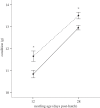Developmental stress increases reproductive success in male zebra finches
- PMID: 25297860
- PMCID: PMC4213612
- DOI: 10.1098/rspb.2014.1266
Developmental stress increases reproductive success in male zebra finches
Abstract
There is increasing evidence that exposure to stress during development can have sustained effects on animal phenotype and performance across life-history stages. For example, developmental stress has been shown to decrease the quality of sexually selected traits (e.g. bird song), and therefore is thought to decrease reproductive success. However, animals exposed to developmental stress may compensate for poor quality sexually selected traits by pursuing alternative reproductive tactics. Here, we examine the effects of developmental stress on adult male reproductive investment and success in the zebra finch (Taeniopygia guttata). We tested the hypothesis that males exposed to developmental stress sire fewer offspring through extra-pair copulations (EPCs), but invest more in parental care. To test this hypothesis, we fed nestlings corticosterone (CORT; the dominant avian stress hormone) during the nestling period and measured their adult reproductive success using common garden breeding experiments. We found that nestlings reared by CORT-fed fathers received more parental care compared with nestlings reared by control fathers. Consequently, males fed CORT during development reared nestlings in better condition compared with control males. Contrary to the prediction that developmental stress decreases male reproductive success, we found that CORT-fed males also sired more offspring and were less likely to rear non-genetic offspring compared with control males, and thus had greater overall reproductive success. These data are the first to demonstrate that developmental stress can have a positive effect on fitness via changes in reproductive success and provide support for an adaptive role of developmental stress in shaping animal phenotype.
Keywords: alternative reproductive tactic; corticosterone; developmental stress; parental care; reproductive success; zebra finch.
© 2014 The Author(s) Published by the Royal Society. All rights reserved.
Figures



References
-
- Sheldon BC. 2002. Adaptive maternal effects and rapid population differentiation. Trends Ecol. Evol. 17, 247–249. (10.1016/S0169-5347(02)02459-X) - DOI
-
- Stamps J. 2003. Behavioural processes affecting development: Tinbergen's fourth question comes of age. Anim. Behav. 66, 1–13. (10.1006/anbe.2003.2180) - DOI
-
- Schoech SJ, Rensel MA, Heiss RS. 2011. Short- and long-term effects of developmental corticosterone exposure on avian physiology, behavioral phenotype, cognition, and fitness: a review. Curr. Zool. 57, 514–530.
Publication types
MeSH terms
Substances
LinkOut - more resources
Full Text Sources
Other Literature Sources

